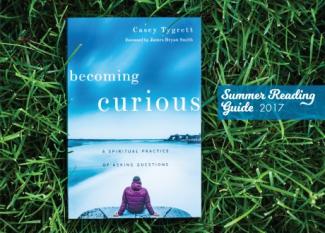Why Faith Needs Curiosity: Summer Reading Series

On the wall in my wife’s office there’s a large framed print, with generous white margins and a multicolored design in the middle.
Over that design, in delicate white script, is a quote by the poet Mary Oliver:
“Tell me, what is it you plan to do with your one wild and precious life?”
What is surprising about this quote is not that it’s in an office, or that someone would choose to print and frame and sell such an item. What is most surprising is how a simple question can be so powerful and inviting. I can’t read that quote without wondering, “Yes, what is it that we’re about today?”
I grew up in a fairly conservative evangelical tradition, and my experience with faith has been far more about finding the right answers than asking new questions. Even the questions that mattered most back then were relatively simple: “What must I do to be saved?” or “Is it okay to drink?” or “Is it okay to dance?” or “Will Dungeons & Dragons send you to hell?”
It was a single question and single answer sort of dance that we did, me and the church.
Yet later in college and in my adult life I’d encounter questions that seemed to simply reproduce. There would arise the kind of question that woke me in the night with a dozen others in a single file line behind it, that couldn’t be answered even with my best study methods and prayer times.
Typically, I’d look for a safe place to ask those questions. The responses were a smattering of “just pray about it” or “let go and let God,” and the core message was, “These questions are not good. They need to be answered and then you need to move on.” Like a sickness to be cured, the questions needed to disappear.
However, if we read up on human development, we find that we are born with questions—curiosity, in other words—as our native software. Kids ask between 300-400 questions per day up until the age of four, and then it drops off significantly throughout our lives.
What happens when we grow up and get old? Why do we agree to stop asking those beautiful questions?
We become immersed in a world of projection—what do others think of us?—so we don’t want to be seen as someone who doesn’t know everything. We get busy and we feel we need more answers and how-tos than questions. We believe that being certain and confident in our certainty is the pinnacle of being alive.
It follows that, if we see our lives in that light, we’d apply that same logic to God. In other words, faith is about becoming more and more certain and less and less curious.
But then there’s Jesus.
Jesus calls disciples who aren’t experts, men with questions that flow out with frightening regularity.
Jesus asks and answers 183 questions in the Gospels, when he “should” have been giving instructions on how God wanted things to run.
Then he says this: “Truly I tell you, unless you change and become like little children, you will never enter the Kingdom of heaven” (Matthew 18:3).
Little children. Children who ask 300-400 questions per day.
So what if Jesus is actually more interested in our curiosity than our certainty?
What if he is looking for students rather than experts?
What if faith is impossible without curiosity?
In other words, what if questions like Mary Oliver’s about our one “wild and precious life,” instead of being dangerous and misguided, are actually part of our faith and growth?
Today, I believe Jesus is inviting us to find our way into a practice of curiosity that takes our questions and turns them into opportunities for God to speak deeply and sweetly to our lives.
Perhaps a good place to start is to find out what questions are actually swimming in your soul. I recommend taking a journal (I prefer paper and pen, but if you do digital ink that works as well) and beginning to exercise your permission to ask any and every question that matters to you.
Take 15 minutes a day for the next week and write out every question that comes to mind. Don’t edit and don’t correct it; simply let those questions that naturally and easily come out land on the page. As you go through each day, the questions will sink deeper and deeper.
As I used this practice in my own life, I began to see things come up that I had no idea about—questions that were frightening but beautiful—and the conversation about what growth in my faith looked like began to change. I began to realize that our faith—the confidence in things that we couldn’t understand or engage with—would be impossible going forward without a healthy dose of curiosity.
So what will you do with your questions?
In other words, to steal from Mary Oliver: what are you going to do with your wild and curious life with God?




